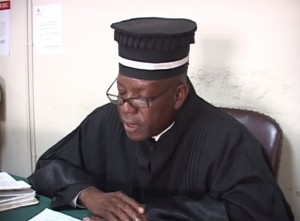by Kevin Edmonds, NACLA
 On July 13, Haitian Judge Jean Serge Joseph passed away under suspicious circumstances—sparking controversy within Haiti that his death was related to his involvement in a high profile corruption investigation against President Michel Martelly’s wife Sophia and their son Olivier.
On July 13, Haitian Judge Jean Serge Joseph passed away under suspicious circumstances—sparking controversy within Haiti that his death was related to his involvement in a high profile corruption investigation against President Michel Martelly’s wife Sophia and their son Olivier.
The charges of corruption against Martelly’s family are related to the disappearance of large sums of money from several nationwide sports and social programs which are personally run by Sophia and Olivier, instead of the respective government ministries that should provide oversight. A group of lawyers, including Newton Louis Saint-Juste and André Michel, initially brought forward the high-profile case in August 2012. On July 2, the case took an important turn when Judge Joseph ordered the Haitian Prime Minister, Laurent Lamothe, and several senior officials to appear in court as witnesses.
The case was widely regarded as an incredibly important step forward for strengthening political accountability, transparency, and the rule of law. However, the future of the case is now in doubt, and the resulting political fallout threatens to further polarize Haitian society.
Several judges have since come forward and remarked that Joseph was under pressure from Martelly to drop the corruption investigation. According to sources close to Joseph, following his decision to involve Lamothe and other high-ranking officials in the case, “The threats became more pronounced and were more specific.” Saint-Juste and Michel have since called the judge’s death “a political assassination.”
Samuel Madistin, a lawyer and close friend of Judge Joseph, has also commented to the media that “The Judge told me before his death that he had a meeting at Mr. Lissade’s (Martelly’s legal advisor) office with President Martelly, Prime Minister Lamothe who pressured him… He told me his life was threatened and they gave him an ultimatum that he had to hold a session on Tuesday in order to put an end to the case.”
Justice Minister Jean Renel Sanon has challenged such allegations, countering that “President Martelly, Prime Minister Lamothe and myself never attended such meeting and we had never pressured the judge to do anything… Such allegations are totally false.” Furthermore, on July 17, President Martelly went on the radio to deny meeting with Joseph and that the case was being needlessly politicized by a small group of opponents who seek to undermine his efforts to fulfill his campaign promises.
On July 16, in an effort to get to the bottom of what happened, the Supreme Council of the Haitian judiciary launched an investigation to determine whether or not the allegations that Martelly and other high level government officials pressured Joseph to cease his corruption investigation. Their findings are set to become public within the upcoming weeks.
Currently, the cause of Joseph’s death is officially unknown, with the admitting hospital stating that he died from a “cerebrovascular accident” or stroke. However Joseph’s family and several high profile politicians doubt this was the case. Senator Moïse Jean Charles has stated that the judge was poisoned during his meeting with Martelly and Prime Minister Laurent Lamothe. Martelly responded in kind, remarking that the Senator was seeking to politicize the event without any evidence.
At the request of his family, Joseph’s body is currently in Montreal where he underwent an autopsy on July 25. The Quebec coroner’s office is currently investigating the death at the request of his family. Joseph, a Canadian citizen, left Haiti and came to Montreal in 1972. He later returned to Haiti in the mid-1990s after studying law at L’Université du Québec à Montréal.
This is not the first time Martelly’s administration has been accused of engaging in acts of corruption, embezzlement, and fraud. Scandals have become routine, with several Haitian media outlets describing these harmful practices as the defining feature of the current government. Martelly has also been undergoing domestic pressure to hold elections for one third of the Haitian Senate in addition to local authorities by the end of the year, but has not given any indication that he plans on making this a reality.
Until a clear consensus on the cause of Judge Joseph’s death emerges, the fast-paced cycle of speculation and denial will continue. While the passing of Joseph temporarily halts the corruption investigation of Martelly’s family, it can only be hoped that an independent judge can take up the case once again without facing threats or intimidation. The outcome of the investigations in Haiti and Quebec and the appointment of a replacement judge in the corruption case has the potential to either bolster or severely damage the Martelly administration. The coming weeks will reveal whether or not the country will be able to move forward or will be consumed by a political crisis of Martelly’s doing.
